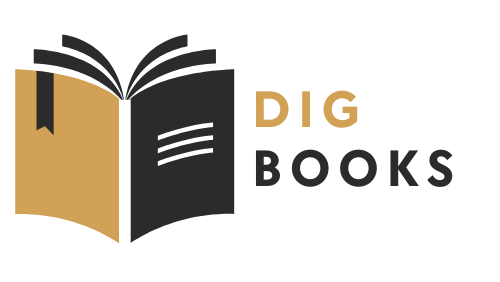10 Best Investing Books To Empower You In 2024
10 Best Investing Books To Empower You In 2024
In the labyrinth of financial markets, navigating the complexities can be a daunting endeavor. Finding the best investing book to light the path is akin to discovering a treasure map in an ancient library. With my years spent amidst the sanctuary of bookshops and the thrill of curating the finest reads, I’ve embarked on a quest to unveil the crème de la crème of investing books. These are not merely texts, but lanterns to guide your steps on the intricate journey of investing.
Key Points:
- The Intelligent Investor by Benjamin Graham is recommended for beginners in investing due to its timeless value investing principles.
- A Random Walk Down Wall Street by Burton G. Malkiel explores market theories and advocates for a broad-market index fund investment strategy.
- The Essays of Warren Buffett by Lawrence A. Cunningham offers deep insights into Warren Buffett’s investment philosophy.
- The Millionaire Next Door by Thomas J. Stanley and William D. Danko challenges stereotypes about millionaires and emphasizes frugality and wise investing.
- Rich Dad Poor Dad by Robert T. Kiyosaki encourages readers to rethink their attitudes towards money and wealth.
- Common Stocks and Uncommon Profits by Philip Fisher focuses on growth investing and company analysis.
- The Dhandho Investor by Mohnish Pabrai provides a straightforward guide on value investing principles.
The books selected stand as towering beacons in the financial world, illuminated by the glow of critical acclaim and reader admiration. They are the chosen few that resonate with beginners craving a solid foundation and seasoned investors aiming to refine their strategies. Each tome is a mosaic of wisdom, carefully pieced together with factual insights, robust sales figures, and the prestigious honor of literary awards.
So, join me, dear reader, as we embark on this enlightening expedition. Let us sift through the sands of financial advice with a joyous heart and an open mind, uncovering the nuggets of wisdom that lie hidden within the pages of these exceptional works. It is my deepest hope that in these collections, you will find not only knowledge but also the inspiration to chart your financial destiny with confidence and grace.
Unveiling the Top 10 Investing Books to Guide Your Financial Journey
The quest for financial wisdom is a noble undertaking, and what better companion along this journey than a book that demystifies the complex world of investing? Each book on this carefully curated list offers unique insights into the art and science of investing, promising to illuminate the path to financial empowerment. From timeless classics to modern masterpieces, these eleven titans of literature stand ready to be your guides.
1. The Intelligent Investor by Benjamin Graham

Benjamin Graham’s “The Intelligent Investor” is nothing short of a beacon for those striving to navigate the foggy waters of investment. Warren Buffett himself heralds it as the ultimate investment guide, emphasizing how it has shaped his own journey. The concepts of ‘value investing’ are articulated with a clarity that pierces through the complexities of the market, making it accessible to novices and veterans alike.
Pro:
- Pioneering guidance on the distinction between investing and speculation.
- Strategies for emotional management and independent thinking in investments.
- Introduction of ‘value investing’ principles, advocating for an analytical, disciplined approach.
- Tailored advice for both ‘defensive‘ and ‘enterprise‘ investors, making it versatile.
Contra:
- Some sections might feel dated due to its original early 1970s publication context.
- Emphasis on dividend maintenance may seem less relevant in today’s changing corporate practices.
- High level of detail means that multiple readings may be required for full absorption.
I recommend this book to you if:
- You’re interested in a time-tested, value-based approach to investing.
- You seek to understand the psychological aspects of investment decision-making.
- You desire a blend of strategic depth and practical advice for different levels of investment engagement.
2. A Random Walk Down Wall Street by Burton G. Malkiel
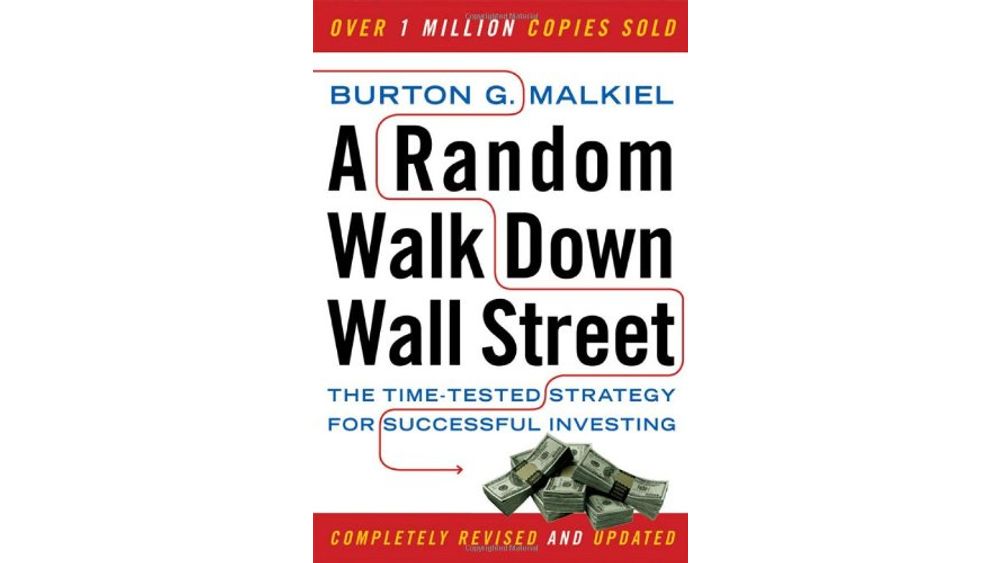
Burton G. Malkiel’s opus, “A Random Walk Down Wall Street,” elegantly deciphers the intricate ballet of the markets, rendering it a must-read for every investor. Its adept mix of historical insight and financial acumen steers readers through the tempest of market manias and bubbles, offering a lens to view the past and future of investing. Malkiel’s fluid narration melds complex theories with approachable, everyday language, making each lesson a joy to discover.
Pro:
- Comprehensive yet digestible exploration of market theories and valuation models.
- Engaging review of historical market trends, infusing valuable lessons with compelling storytelling.
- Advocates for a broad-market index fund investment strategy, presciently ahead of its time.
- Introduction to behavioral finance, spotlighting how investors can be their own adversaries.
Contra:
- Skepticism towards technical and fundamental analysis may conflict with some investors’ beliefs or strategies.
- Some readers may seek more detailed guidance on portfolio construction than provided.
- The extensive coverage of market history and theories might overshadow current, practical advice for some.
I recommend this book to you if:
- You’re intrigued by the psychological aspects of investing and market behavior.
- You prefer a balanced view that includes historical insights alongside investment strategies.
- You’re looking to understand the rationale behind broad-market index funds and long-term investing.
3. The Essays of Warren Buffett by Lawrence A. Cunningham
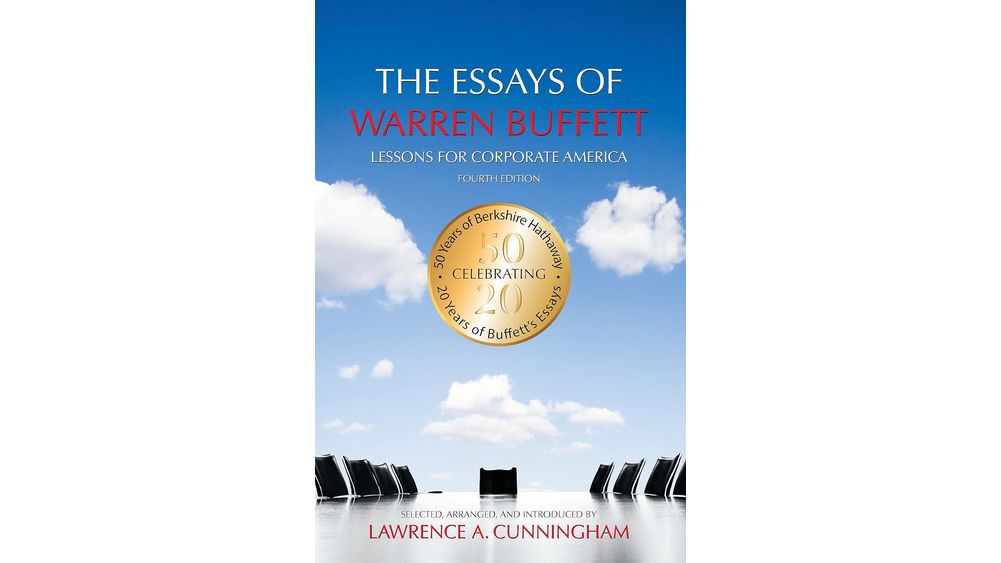
In crafting a collection that delves deep into the wisdom of Warren Buffet, Lawrence A. Cunningham has blessed the financial world with The Essays of Warren Buffett. Within its pages, investors are treated to a plethora of topics, ranging from governance and investing to valuations and acquisitions, making it a treasure trove of knowledge. The book not only provides intuitive insight into the investing genius of Buffett but also offers a timeless relevance, particularly in times when market economics seem most perplexing.
The beauty of this compilation is its ability to convey complex financial concepts in approachable language, which encapsulates the essence of Buffett’s successful investment philosophy. Meanwhile, the segments on aligning interests and governance reflect on practices that, although discussed in a bygone era, remain alarmingly pertinent today, ensuring readers grasp the fundamental import of conscientious investing.
Pro:
- Offers a deep dive into Buffett’s investment philosophy across a broad range of topics.
- Provides timeless insight, making it a valuable read in any economic climate.
- Written in accessible language, suitable for both beginners and seasoned investors.
Contra:
- Some discussions on alternative investments and specific financial instruments might feel dated.
- The emphasis on governance and ethical considerations may not appeal to those looking for quick financial tactics.
I recommend this book to you if:
- You’re intrigued by the thought process of one of the greatest investors of our time.
- You appreciate a comprehensive approach to investing that goes beyond mere tactics.
- You’re looking for a book that provides both timeless wisdom and practical advice.
4. The Millionaire Next Door by Thomas J. Stanley and William D. Danko
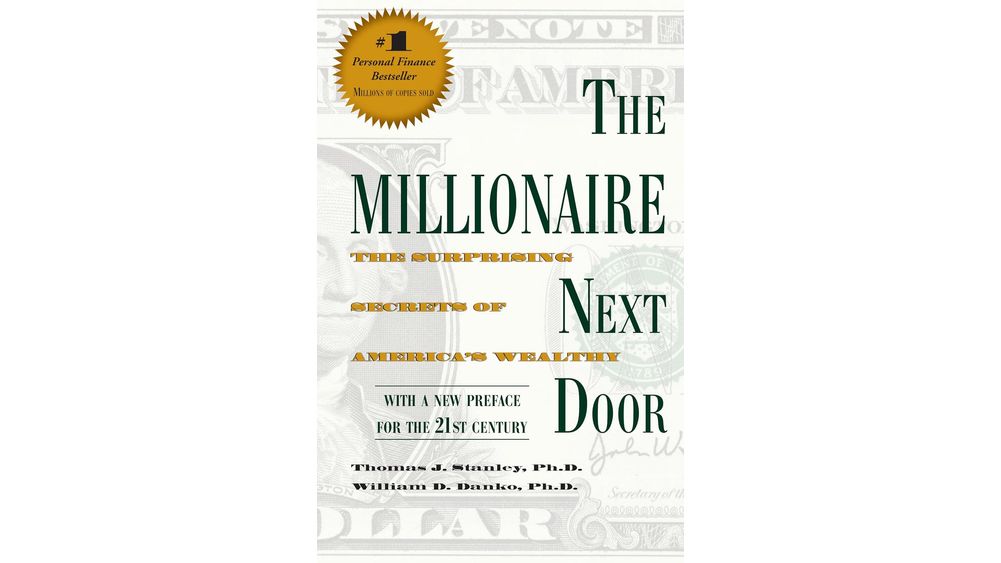
The Millionaire Next Door presents a startling and insightful exploration of the true nature of wealth in America, revealing that the image of millionaires living lavish lifestyles could not be further from the truth. Through meticulous research, Thomas J. Stanley and William D. Danko dispel myths, showcasing that real millionaires live below their means, invest wisely, and, most importantly, understand the difference between being rich and being wealthy.
This book emphasizes frugality, smart financial planning, and the value of financial independence over displaying high social status, offering readers practical strategies for accumulating wealth over time. It’s particularly enlightening to learn how many self-made millionaires gained their wealth through discipline, smart investing, and avoiding the trap of living a hyper-consumptive lifestyle.
Pro:
- Reveals the real habits and lifestyles of true millionaires, challenging common stereotypes.
- Provides actionable advice on wealth accumulation and financial independence.
- Encourages a mindset of frugality and long-term planning beneficial at any life stage.
Contra:
- Some may find the message of frugality and modest living unappealing or difficult to apply.
- The principles discussed might feel basic or already familiar to financially savvy readers.
- It reiterates the importance of delayed gratification, which may be challenging for many to embrace.
I recommend this book to you if:
- You’re young and starting on your financial journey, looking for foundational wisdom.
- You wish to understand the true nature of wealth and how to achieve it over time.
- You’re seeking a shift in your financial mindset towards more sustainable wealth-building practices.
5. Rich Dad Poor Dad by Robert T. Kiyosaki

“Rich Dad Poor Dad” stands as a beacon of financial liberation, challenging conventional wisdom and encouraging readers to take the reins on their journey towards financial independence. Robert T. Kiyosaki masterfully contrasts the mindset differences between his two dads, one rich and one poor, to highlight how attitudes towards money can significantly affect one’s financial destiny. This book doesn’t just offer financial doctrine; it’s a call to break out from financial dogmas that have been holding you back.
The emphasis on financial education as a vehicle towards wealth is indeed refreshing and empowering. Kiyosaki buttresses his points with personal anecdotes and insights that make the book not only an educational read but also deeply relatable and engaging. He nudges readers to question their preconceived notions about money and to perceive investment and financial growth as an accessible reality, notwithstanding their current economic standing.
Pro:
- Challenges traditional perspectives on money and investment, encouraging financial independence.
- Simplifies complex financial concepts, making them accessible to everyone.
- Inspires a proactive approach to learning and personal finance management.
Contra:
- May oversimplify some aspects of investment and financial planning.
- Its criticism of traditional education might not resonate with everyone.
- The book’s strong emphasis on real estate might not align with every reader’s investment preferences.
I recommend this book to you if:
- You’re looking to transform your mindset regarding money and wealth.
- You’re a beginner in personal finance seeking an empowering and accessible guide.
- You’re interested in understanding the impact of financial education on wealth accumulation.
6. Common Stocks and Uncommon Profits by Philip Fisher

In the treasure trove of investment literature, “Common Stocks and Uncommon Profits” by Philip Fisher stands out for its timeless relevance and insightful advice. Fisher, an investment guru whose wisdom has guided generations, shares his scuttlebutt method as a compelling strategy for stock analysis. This technique, heavily relying on gathering information from various sources except the company of interest, represents a unique approach to understanding market dynamics. Fisher’s emphasis on growth investing, paying a premium for high-quality stocks, and the importance of company analysis over mere number crunching have inspired investors like Warren Buffett and are instrumental in shaping modern investment philosophy.
Pro:
- Offers an in-depth exploration of the scuttlebutt method, emphasizing the value of external research.
- Encourages a growth investing approach, advising readers to invest in companies with potential for sustained growth.
- Fisher’s investment principles have been tried and tested over decades, proving their effectiveness in building lasting wealth.
Contra:
- The emphasis on growth investing may not align with every investor’s strategy, particularly those with a preference for value investing.
- The methods proposed require a considerable amount of time and dedication to implement effectively.
- Some readers may find the detailed approach to research intimidating or too time-consuming.
I recommend this book to you if:
- You’re interested in growth investing and willing to invest time in research.
- You value insights from seasoned investors like Philip Fisher.
- You’re looking for time-tested investment strategies with a historical track record of success.
7. One Up On Wall Street by Peter Lynch
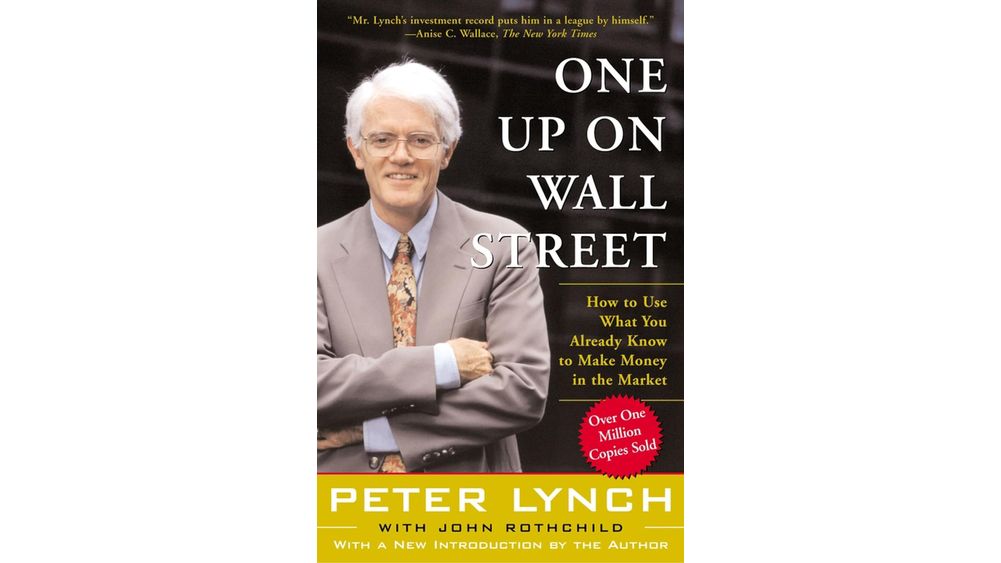
In “One Up On Wall Street,” Peter Lynch shares his incredible journey as a highly successful mutual fund manager, offering a treasure of insights into the world of investing. Lynch’s investing philosophy is grounded in leveraging what you already know to find great investment opportunities in everyday products and services. This approach makes the stock market more accessible and less intimidating for individual investors. While the book was penned in 1989, Lynch’s core investment principles, such as investing in what you understand and paying attention to company fundamentals, remain relevant and highly applicable in today’s market environment.
Pro:
- Introduces a simple, intuitive approach to investing that empowers individual investors to use their everyday experiences.
- Timeless investing advice that transcends market cycles and economic changes.
- Provides a practical guide on how to conduct personal stock analysis, demystifying the complexities of the stock market.
Contra:
- Some of the examples and market conditions discussed are dated, potentially making direct application to today’s market challenging.
- Lynch’s personal investment stories, while insightful, might lead to overconfidence in one’s ability to pick ‘winning’ stocks without sufficient analysis.
- The book does not deeply cover modern financial tools and techniques that have become more prevalent in recent years.
I recommend this book to you if:
- You’re looking for a foundational text on personal investing with practical advice.
- You prefer a straightforward, common-sense approach to stock market investing.
- You’re a fan of Peter Lynch’s work and wish to understand his investing philosophy more deeply.
8. The Psychology of Money by Morgan Housel
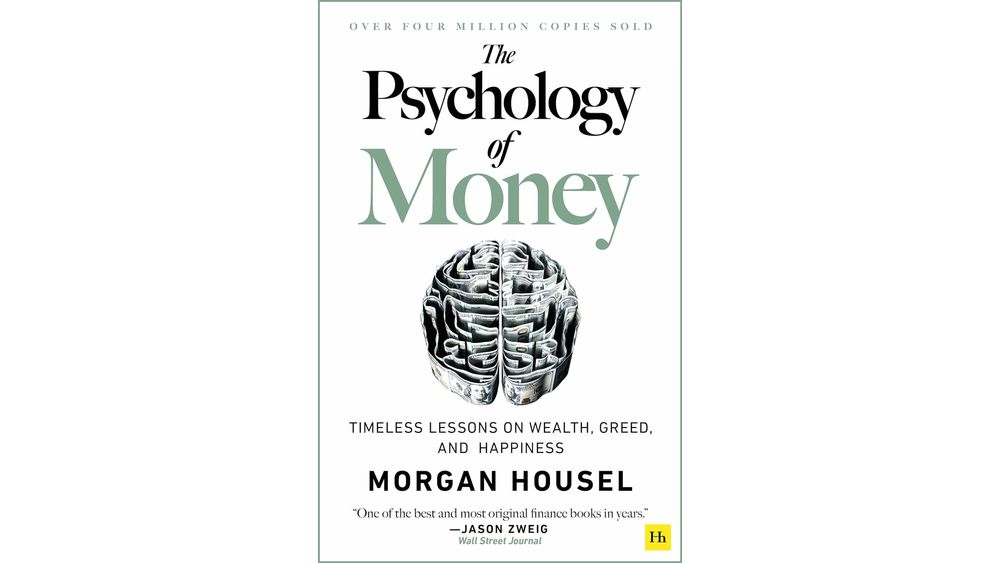
Morgan Housel’s “The Psychology of Money” explores the profound impact of behavioral psychology on personal finance and investing. Through engaging anecdotes and historical insights, Housel unveils the oft-overlooked truth that successful financial planning is less about crunching numbers and more about understanding human behavior and emotional biases. The book shines a light on the importance of savings and maintaining a margin of safety, driving home the point that wealth accumulation is not an overnight success but a result of prudent financial habits and decisions taken over time. Housel’s work prompts readers to rethink their relationship with money, emphasizing long-term financial health over short-term gains.
Pro:
- Offers insightful analysis on the emotional aspects of money that govern financial decisions.
- Provides simple yet powerful strategies for achieving long-term financial stability.
- Engages readers with compelling stories and examples, making complex concepts accessible and understandable.
Contra:
- Readers looking for in-depth investment strategies may find the book’s focus on psychology too broad.
- Some may consider the advice too conservative, especially those seeking aggressive growth tactics.
- The overarching emphasis on behavioral finance might overlook some technical aspects important for investment success.
I recommend this book to you if:
- You’re interested in how psychological factors influence financial decisions.
- You want to cultivate a healthier relationship with money.
- You’re looking for insights into achieving financial stability through mindful spending and saving.
9. The Bogleheads’ Guide to Investing by Taylor Larimore, Mel Lindauer, and Michael LeBoeuf
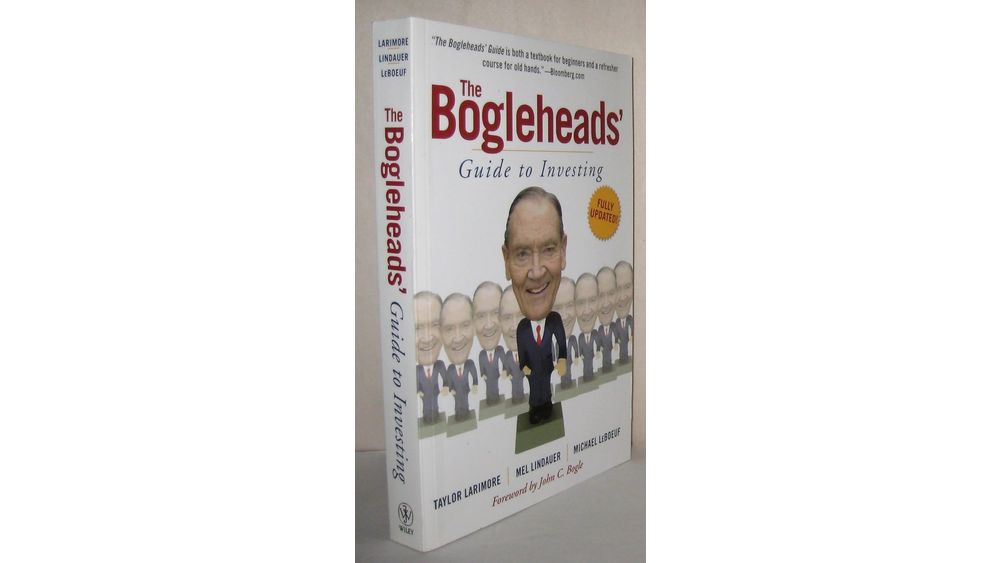
“The Bogleheads’ Guide to Investing” provides a comprehensive introduction to the principles of low-cost investment strategies championed by John Bogle, the founder of Vanguard. Written with both novices and seasoned investors in mind, the book distills complex investment concepts into simple, actionable advice that focuses on long-term investing, asset allocation, and minimizing costs. The authors underscore the importance of starting early, living below your means, and investing in index funds as a path to financial independence. This guide stands as a testament to Bogle’s philosophy that average investors can achieve superior returns by keeping it simple, focusing on the long haul, and avoiding the pervasive noise of market speculators.
Pro:
- Provides a clear, straightforward investment strategy based on historically proven principles.
- Emphasizes the importance of long-term, disciplined investing, avoiding the pitfalls of market timing and speculation.
- Offers practical advice on portfolio diversification, tax efficiency, and reducing investment costs.
Contra:
- Investors seeking more sophisticated, active trading strategies may find the book’s approach too simplistic.
- Some readers might prefer more up-to-date content on digital assets and modern financial technologies.
- The strong advocacy for index fund investing may not appeal to those interested in exploring alternative investments.
I recommend this book to you if:
- You are new to investing and looking for a solid foundational guide.
- You believe in the long-term, passive investment approach championed by John Bogle.
- You’re seeking practical advice on building a low-cost, diversified portfolio that can withstand market fluctuations.
10. The Dhandho Investor by Mohnish Pabrai

In the realm of investing books, “The Dhandho Investor” by Mohnish Pabrai stands out as a beacon for value investors. Through a blend of captivating “rags to riches” stories of Indian immigrants and profound investment principles, Pabrai makes the complex world of investments accessible and deeply engaging. The Kelly Criterion Formula, a novel approach for many readers, provides a scientific method to asset allocation, transforming how one may perceive investment risks and rewards.
Pabrai’s book is not just a read; it’s a journey through the essence of value investing, echoing the principles of legends like Buffett and Munger. What makes Pabrai’s narrative so compelling, aside from the strategic insights like making “big bets” and timing them right, is his ability to narrate complex ideas in a manner that’s both enlightening and profoundly simple to grasp. It’s a treasure trove for investors who seek to elevate their game by adopting calculated, high-impact investment strategies.
Pro:
- Offers a straightforward and easy-to-understand guide on value investing.
- Includes inspirational examples and real-life success stories.
- Introduces readers to the Kelly Criterion Formula for optimized asset allocation.
Contra:
- Focused primarily on value investing, which might not appeal to those looking for a broader overview of investing strategies.
- Emphasizes large, infrequent bets, a strategy that may not align with more conservative investors’ preferences.
- Some concepts might seem repetitive to those familiar with Buffett and Munger’s philosophies.
I recommend this book to you if:
- You’re intrigued by the principles of value investing.
- Seeking practical, actionable investment insights.
- You appreciate learning through real-world examples and stories.
FAQs
1. Which book is best for absolute beginners in investing?
For absolute beginners in investing, “The Intelligent Investor” by Benjamin Graham is often recommended. Its timeless wisdom lays a solid foundation in value investing principles and emphasizes long-term strategies over speculative wins, making it an ideal starting point for newcomers.
2. Are these books suitable for experienced investors as well?
Yes, these books are suitable for experienced investors as well. Each book, including “The Intelligent Investor” and “The Dhandho Investor,” offers deep insights and advanced strategies that can refine and redefine an experienced investor’s approach, ensuring that there is always a new perspective or strategy to consider, regardless of one’s level of expertise.
3. How can I apply the principles from these books to my own investing strategy?
Applying the principles from these books to your own investing strategy can greatly enhance your financial literacy and decision-making skills. Start by outlining your financial goals and risk tolerance. Then, extract key insights from each book, such as the importance of value investing from “The Intelligent Investor” or the significance of emotional discipline in “The Psychology of Money”. [1]
Integrate these insights into your investing strategy by setting clear, actionable steps. For example, creating a diversified portfolio could reflect lessons from “A Random Walk Down Wall Street”. Continuously refining your strategy as you gain more knowledge and experience is crucial for long-term success.
4. Can reading these books help me understand the stock market better?
Reading these books can undoubtedly help you understand the stock market better. Insights shared by authors with decades of investing experience provide you with a blend of theoretical knowledge and practical advice. Books like “The Essays of Warren Buffett” and “One Up On Wall Street” offer deep dives into the strategies of investing legends, equipping you with perspectives to navigate market complexities.
By engaging with diverse viewpoints, from the psychological aspects in “The Psychology of Money” to the technical analysis in “Common Stocks and Uncommon Profits”, your comprehension of market dynamics is sure to improve.
Important Tips for Aspiring Investors
Becoming a savvy investor doesn’t happen overnight. It requires patience, education, and prudence. Here are crucial tips to keep in mind:
- Never stop learning: The stock market is constantly evolving. Keeping abreast of the latest trends and continuing to educate yourself through books, articles, and courses is fundamental.
- Start small and diversify: Don’t put all your eggs in one basket. Begin with modest investments across different sectors to mitigate risks.
- Understand the power of compounding: Reinvesting your dividends can significantly increase your investment over time. It’s the snowball effect in action.
- Stay disciplined: Resist the urge to follow market hype. Develop a long-term investment strategy and stick to it, making adjustments as your goals and market conditions change.
- Living by these guidelines and applying the wisdom found in the books listed can set you on the path to becoming a confident and successful investor.
Maximizing Your Investment Knowledge
To truly empower oneself in the world of investing, it’s crucial to immerse in continuous learning. As you embark on this journey, consider your chosen materials carefully, prioritizing books that not only inform but also inspire. This curated list of the 10 best investing books is an excellent starting point, providing a foundational knowledge that spans the basics to more complex investment strategies.
Dive deeper into each book, not just reading but actively engaging with the content. Consider keeping a journal where you can note down key points, reflections, and how you might apply what you’ve learned to your personal investing strategy. Engagement like this transforms reading from a passive activity into an active exploration of wealth creation. [2]
Additionally, don’t limit your education to just books. Explore other resources such as podcasts, investment blogs, and financial news. Joining investment forums and communities can also be incredibly beneficial, allowing you to discuss ideas, get feedback, and learn from the experiences of others. This multi-pronged approach to learning will maximize your investment knowledge and ensure you’re well-equipped to make informed decisions.
Building a Diverse Investment Portfolio
A key principle in investing is diversification. This strategy involves spreading your investments across various asset classes to reduce risk and take advantage of different market conditions. To build a diverse investment portfolio, understanding the fundamentals as detailed in the best investing books is indispensable.
- Start by assessing your risk tolerance. This will guide how you allocate assets between stocks, bonds, real estate, and other investments.
- Educate yourself on the various asset classes and how they react to market conditions. Books like “The Intelligent Investor” provide timeless advice on value investing, while “A Random Walk Down Wall Street” introduces the concept of an efficient market hypothesis, making them great starting points.
- Regularly review and adjust your portfolio as needed to ensure it aligns with your financial goals and takes into account changing market dynamics.
Remember, diversification is not about having the most investments, but about having the right mix that will help you achieve your financial objectives while minimizing losses during volatile market periods.
Conclusion
In wrapping up, embracing the wisdom shared in the pages of these top selections can significantly illuminate your financial path. Each best investing book mentioned herein holds the potential to expand your understanding, refine your strategies, and, ultimately, empower your investment journey.
Choosing the right investment literature will not only equip you with knowledge but will also inspire you to pursue your financial goals with greater confidence. Whether you’re a novice eager to chart your course or a seasoned investor looking to broaden your horizons, there’s something in these pages for you.
As we turn the last page of this guide, I hope you feel inspired and more connected to your financial aspirations. Remember, the journey to investment mastery is continuous, and every book is a step towards greater financial empowerment. Happy investing, and may your financial dreams become your reality. Warmest wishes to you,
Emma
